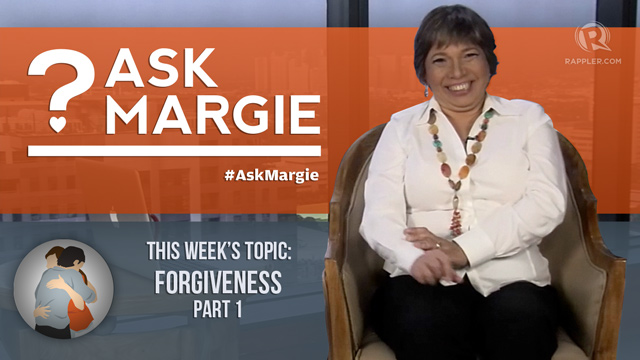SUMMARY
This is AI generated summarization, which may have errors. For context, always refer to the full article.

MANILA, Philippines – After a series of episodes on betrayal, #AskMargie viewers inevitably asked when and how can they forgive.
This week, clinical psychologist starts a series of episodes on forgiveness.
Watch:
Let’s start with your questions and, happily enough, your observations which answer the questions of your colleagues.
Trelly Marigza: Will forgiveness suffice without justice?
To which Elisa Fruto says: To forgive is very difficult without justice.
Sonny Mendoza: When I was younger, I thought forgiving is a weakness, a surrender to somebody who is stronger than me. Forgiving was an imposition from somebody older than me.
Now, I see forgiving as my greatest strength. It is beyond mere emotions. When I forgive someone, I feel so good, I become teary-eyed. But there is a caveat: I don’t forgive unless one is sincerely sorry.
Alfie Mella: The concept of forgiveness that I subscribe to is the one that aligns with my own understanding of the term.
To me, forgiveness is not an action; it is a reaction. Meaning, someone must ask forgiveness from another (the action) and then the “other” gets to decide to give the forgiveness being asked (the reaction).
Based on this logic, I cannot forgive anyone who has not actually asked me directly for forgiveness. If someone did me wrong, I could forgive her only if she asks. And I get to decide if I will forgive her on not, based on my observation if there’s remorse on her part and if I’m ready to grant her the peace of mind.
I say “peace of mind” because a person asking forgiveness wants to satisfy her own self–she wants to make herself feel good, she wants to cleanse herself of the burden of guilt–so she wants absolution from the person whom she has wronged.
To ask forgiveness is basically a self-serving action.
On the part of the person being asked to forgive–it is a self-serving reaction. When he decides to forgive, it means the pain he felt is already gone and does not affect him anymore, so he’s now ready to give the reaction of forgiveness.
Panalo Ako asks: Setting aside any religious or societal belief, is forgiveness really necessary? Does forgiveness entail an absence of punishment? How come some people live without forgiving and yet live their lives in peace?
MOI: Indeed, these are truly wonderful questions, Panalo Ka. They get to the essence of what forgiveness is and isn’t. Happily enough, we have many colleagues who serendipitously answered your questions when sharing their own thoughts on forgiveness:
Evangeline Sangalang: I don’t get the concept. Forgive means zero penalty. Offender is absolved of the crime. I say let the offender pay and feel the consequences of his actions. Forgiving is not a prerequisite for moving on. Neither is forgetting.
Ces Millado: In the context of relationships, I find that self-forgiveness is sometimes more essential, and oftentimes more difficult, that is, I forgive myself for giving permission to that person to even have been in my life.
To which Evangeline Sangalang responds: I think Ces raised a crucial point. Who do we forgive? Myself for being “stupid and trusting” ergo opened myself to vulnerability? Or is it about forgiving the offender? Is that supposed to make the victim feel good and “free”? I can be over the feeling, can be empowered and to really move on without giving up my right to seek justice.
– Rappler.com
Add a comment
How does this make you feel?
There are no comments yet. Add your comment to start the conversation.